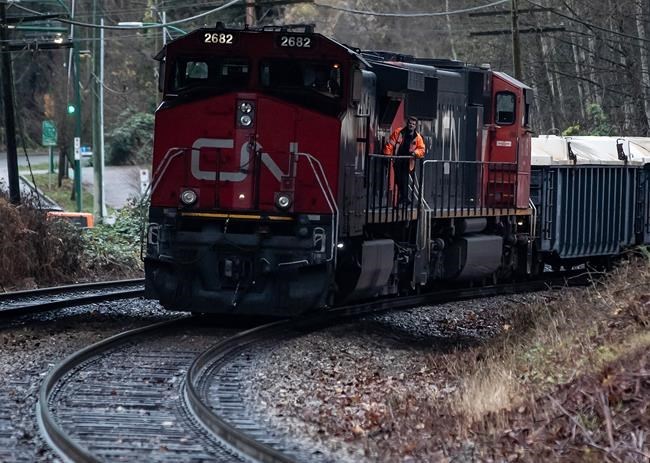Canadian National Railway Co.'s embattled CEO is retiring in the new year, the railway says as it reported a big jump in third-quarter profits thanks in part to a $770-million after-tax break fee it received after walking away from a takeover bid for Kansas City Southern railway.
The Montreal-based company says Jean-Jacques Ruest will leave at the end of January or when a successor has been appointed. Ruest has been a target for replacement by activist shareholder TCI Fund Management Ltd.
"I am not going anywhere and I will deliver with the team here today around me on the fourth-quarter results and to be sure that we have a successful setup to the 2022 business plan," he told analysts in a conference call after markets closed.
Railway chairman Robert Pace said Ruest had deferred his retirement due to the KCS transaction and introduction of its strategic plan.
TCI has proposed former CN chief operating officer Jim Vena but Ruest said a search committee will consider a wide variety of candidates both inside the railway and elsewhere.
"We know there is some candidate out there, at least one, but I think the world is bigger than that. And before the board makes a decision, we want to be very, very thorough."
CN said it earned $1.685 billion or $2.37 per diluted share for the three months ended Sept. 30, up from $1.38 per share or $985 million a year earlier.
Excluding one-time items such as the break fee, adjusted earnings increased 9.5 per cent to $1.08 billion or $1.52 per share, up from $985 million or $1.38 per share in the third quarter of 2020.
Revenues increased 5.3 per cent to $3.59 billion, up from $3.41 billion.
CN was expected to report $1.44 per diluted share in adjusted profits on $3.54 billion of revenues, according to financial data firm Refinitiv.
CN said its operating ratio, a key measure of railroad efficiency where a smaller number is better, increased 2.8 points to 62.7 per cent due to the impact of fires in Western Canada and other factors, while the adjusted ratio improved to 59.0 per cent.
The railway is "making progress on executing our strategic plan," Ruest said. "This includes delivering immediate shareholder value while maintaining our long-term commitment to safety, customer service and sustainable value creation."
CN said it has already achieved 75 per cent of the promised jobs cuts of more than 1,000. Nearly 600 are management workers and 190 unionize with most taking place in Canada. It has also reduced the use of consultants.
The railway expects all parts of its business will grow in 2022 except for grain as it anticipates a 10 per cent increase in adjusted earnings per share in 2021 above $5.30 in 2020.
The results came a day after TCI made its case for replacing four directors and Ruest in a bid to improve the railway's financial performance. A special shareholder meeting is set for March 22.
TCI is unhappy with CN's bid to acquire KCS, saying it is among some questionable decisions made by the railway. It launched its efforts in response to CN's US$33.6-billion takeover bid for Kansas City Southern.
CN netted the break fee when KCS determined CP's bid was superior after the U.S. railway regulator rejected its request for a voting trust.
Ruest rejected suggestions that his departure moves the railway closer to what TCI has been demanding.
"I think it's maybe the other way around, it's maybe TCI is getting closer to what CN's long-term strategy is," he said.
Ruest said CN's strategy is to position the company for the future and is looking for a leader focused on growth and having a diverse workforce.
Referring to an adage by hockey great Wayne Gretzky, he said CN wants to be where the puck will be next, not where it was in 2010 or 2015.
"When you look for a CEO in early 2022, you want to have somebody who can actually get the company the way it needs to be in 2025."
In a news release, TCI founder and portfolio manager Chris Hohn said a CEO change doesn't go far enough.
"Dismissing the same CEO that the Board put in place just three short years ago is a good start, but it does not address the fundamental problem of a lack of leadership, failed strategic oversight, and the vacuum of operational expertise at the Board level," he said.
"Putting a new plan out a month ago without having the CEO needed to implement it is a massive corporate governance failure and puts the future of the Company at risk. The good news is TCI has a clear plan and the right people available now to fix that."
Analyst Cameron Doerksen of National Bank Financial says TCI's written submission to shareholders was short on specifics about proposed changes to improve CN's financial and operational performance.
He said CN management has two quarters before the March shareholder meeting to show progress toward its financial targets.
The often bitter proxy battle has seen each side accuse the other of making inaccurate and misleading statements.
TCI has denied CN's claim that it is in a conflict of interest by being the largest shareholder of rival Canadian Pacific Railway Ltd. in addition to being the second-largest CN investor.
This report by The Canadian Press was first published Oct. 19, 2021.
Companies in this story: (TSX:CNR, TSX:CP)
Ross Marowits, The Canadian Press
Note to readers: This is a corrected story. An earlier version included an incorrect break fee figure.




